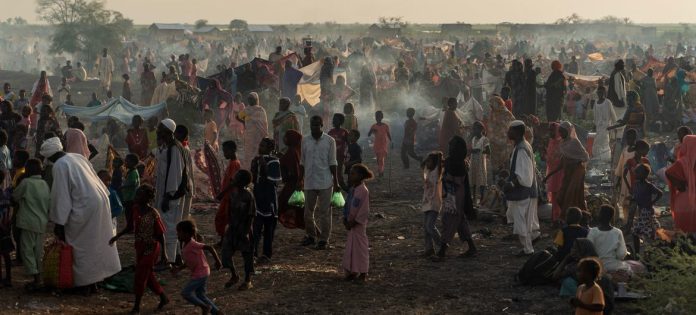Children end up in war zones because of the British refusal to ease visa rules for refugees, The Guardian reported.
Children face dropping into war zones because of the heavy and conflicting bureaucratic requirements of one of the few legal routes for asylum seekers, according to the charity Ramfel.
Ramfel cited the military situation in Sudan in April 2023 as an example. Back then, the organisation supported 14 people, all of whom were eligible to come to the UK through the scheme. However, now more than a year later, eight people remain trapped there and face extreme risk. Some of them are children who have previously fled Eritrea, a repressive dictatorship that carries out forced conscription of men, women and children.
Some teenagers left Sudan by illegal routes, with one boy detained in Libya and another unaccompanied child trafficked to South Sudan and raped. Only two of the children who were in Sudan during the conflict have travelled to the UK. However, the government has not agreed to remove the requirements for applicants to register their fingerprints and biometric information in person, even though the visa centre in Khartoum has closed.
An Eritrean refugee living in the UK described his desperate attempts to persuade his two younger brothers, aged 17 and 14, to join him. They fled to Sudan alone after their mother died and their father captured by Eritrean authorities, and were living in a refugee camp when fighting broke out. As the conflict spread, his brothers fled north from Khartoum to Egypt, where they live illegally and face arrest and detention by the authorities. He said he himself travelled to the UK as a teenager in 2018 and has gained refugee status since then, said he did not understand why his younger brothers were not allowed to board a plane to the UK from Sudan.
The Home Office failed to consider a request to bypass biometric registration of the children last October and Ramphele is now trying to register them in Cairo. But said: “Visa Application Centres are open and operating in neighbouring countries. However, travel across Sudan is conducted at your own risk, and under your own discretion, considering whether it is safe to do so.”
The charity cited the war in Sudan as an example of the “complete failure” of the family reunification process, which primarily targets children and spouses of UK residents and can only expand to siblings and other close relatives. Rampfel argues that the situation is forcing more refugees to take irregular routes, eventually leading to small boats crossing the Channel, with the number of trips reaching record levels. Nick Beales, head of campaigning at the charity, underlined:
The UK’s family reunion system is not fit for purpose and this report shows that it does not act as an effective safe route for refugees seeking to come to the UK. For people in places such as Sudan and Gaza, they are prevented from even applying for family reunion due to the government’s inflexible and unreasonable insistence on them attending non-existing visa application centres. This leaves those in conflict zones, including unaccompanied children, with no choice but to take dangerous journeys in search of family reunification.
Rampfel called on the next government to create a process that will allow those with loved ones in the UK to quickly and safely obtain visas to legally travel to the UK.
The department said they cannot refuse to check fingerprints and facial images because they are essential to verify the identity and suitability of foreign nationals subject to immigration control. In 2023, 9,764 refugees obtained family reunification visas, half of whom were children, according to Home Office figures.
